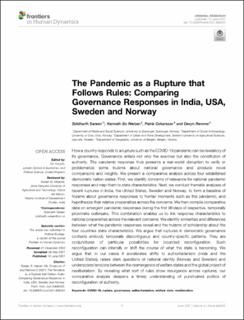The Pandemic as a Rupture that Follows Rules: Comparing Governance Responses in India, USA, Sweden and Norway
Journal article, Peer reviewed
Published version

Åpne
Permanent lenke
https://hdl.handle.net/11250/2831804Utgivelsesdato
2021Metadata
Vis full innførselSamlinger
- Department of Geography [634]
- Registrations from Cristin [9791]
Sammendrag
How a country responds to a rupture such as the COVID-19 pandemic can be revelatory of its governance. Governance entails not only the exercise but also the constitution of authority. The pandemic response thus presents a real-world disruption to verify or problematize some truisms about national governance and produce novel comparisons and insights. We present a comparative analysis across four established democratic nation-states. First, we identify concerns of relevance for national pandemic responses and map them to state characteristics. Next, we conduct thematic analyses of recent ruptures in India, the United States, Sweden and Norway, to form a baseline of truisms about governance responses to frontier moments such as this pandemic, and hypothesize their relative propensities across the concerns. We then compile comparative data on emergent pandemic responses during the first 90 days of respective, temporally proximate outbreaks. This combination enables us to link response characteristics to national propensities across the relevant concerns. We identify similarities and differences between what the pandemic responses reveal and the truisms of scholarship about the four countries state characteristics. We argue that ruptures in democratic governance contexts embody temporally discontiguous and country-specific patterns. They are conjunctures of particular possibilities for bounded reconfiguration. Such reconfiguration can intensify or shift the course of what the state is becoming. We argue that in our cases it accelerates shifts to authoritarianism (India and the United States), raises stark questions of national identity (Norway and Sweden) and underscores tensions between the reemergence of welfare states and the global project of neoliberalism. By revealing what sort of rules show resurgence across ruptures, our comparative analysis deepens a timely understanding of punctuated politics of reconfiguration of authority.
